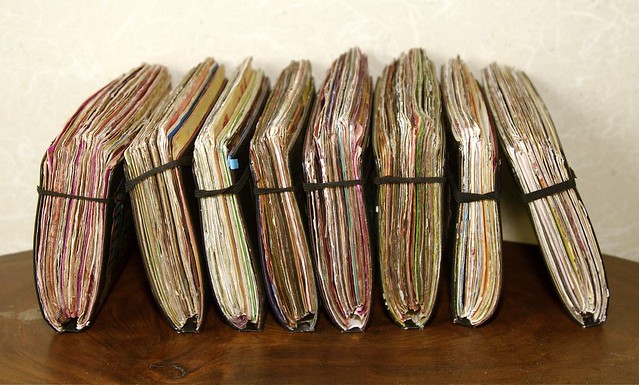Never say anything in writing that you wouldn’t say comfortably in conversation. — William Zinsser

© 2008 Barry Silver, Flickr | CC-BY | via Wylio
Yesterday, I packed up my collection of journals – pages and pages of sporadic writing (I’ve never been one of those every day journallers) from college until now. There’s one notebook I used in my senior year of college that I just love partially because of it’s cover – a light blue with a starlit print on the front – and partially because it’s the first journal in which I used my favorite pen – the Uniball Vision Elite. I know these are superficial reasons to love a journal, but they are real.
And they make up for the overtly pretentious, profoundly striving writing I was doing in those pages.
I flipped through just a few entries before I tucked the book into a box, and I found myself grinning at how hard I was trying to sound elegant and intellectual. I had clearly bought into the “idea” of myself as a writer and academic, but I equally clearly did not believe myself to be those things.
It has taken me a long time to be comfortable with who I am as a person and as a writer. I’m not really an academic – although that’s not a fault of intellect or desire but more of temperament – and “elegant” is not a word that would really describe me either. Rather, I’m me. (Notably, I’m finding it hard to put positive labels on myself, which is something I’ve also learned to be true of me – a innate belief that self-praise is pride creeping in rather than the honesty I urge in other people.) I’m loyal and dedicated, and I so value the casual and simple things of life – a great book, a long conversation with a friend, a walk with leaves crunching under my feet.
***
Once, I wrote an essay about the ways that my language changed from situation to situation – about how the academic world kept pushing me to let go of my casual phrases – to float up into my mind instead of staying tied by blood to my hands. The piece got published, but I think, now, not because of the point I came to in the piece. I had been saying, then, that I was learning to adjust our language to the situation. But I suspect that the editors saw with more honesty what I was doing – chafing against that expectation that I could not be fully me in the things I was writing for school.
If there’s one thing I have come to believe about writing (and the life for which writing is a day to day metaphor), it’s this – be yourself. Don’t be who the situation expects you to be, and don’t be what you think will sell. Don’t try to sound like that famous writer or that woman who makes your skin dance in her presence. Those people are beautiful and strong because of who they are, but you cannot be them.
Just be you – full of mistakes and the beauty that catches your breath. Say things the way you hear them when you speak them to yourself. Write the stories that prick the edges of your heart and pound them out as they come to you, not later, when you think you will be better or time will suddenly become more abundant. Write who you are today.
I take joy in those journals now because I see them for who I was then – a young woman trying to convince herself of who she would become. In that, they are profoundly honest . . . and they remind me of who I actually am now – dirt under my nails, academics long behind me, and words always at my fingers.
Who are you today? Take a few minutes and write that down. Then, if you want, share it here. I’d really like to know you more.
